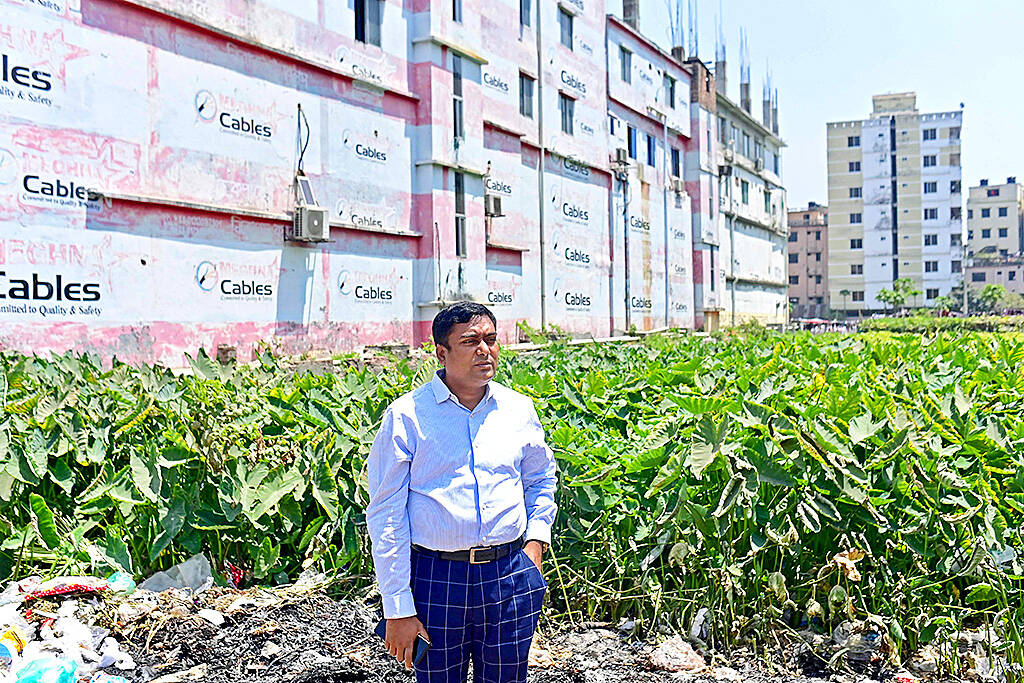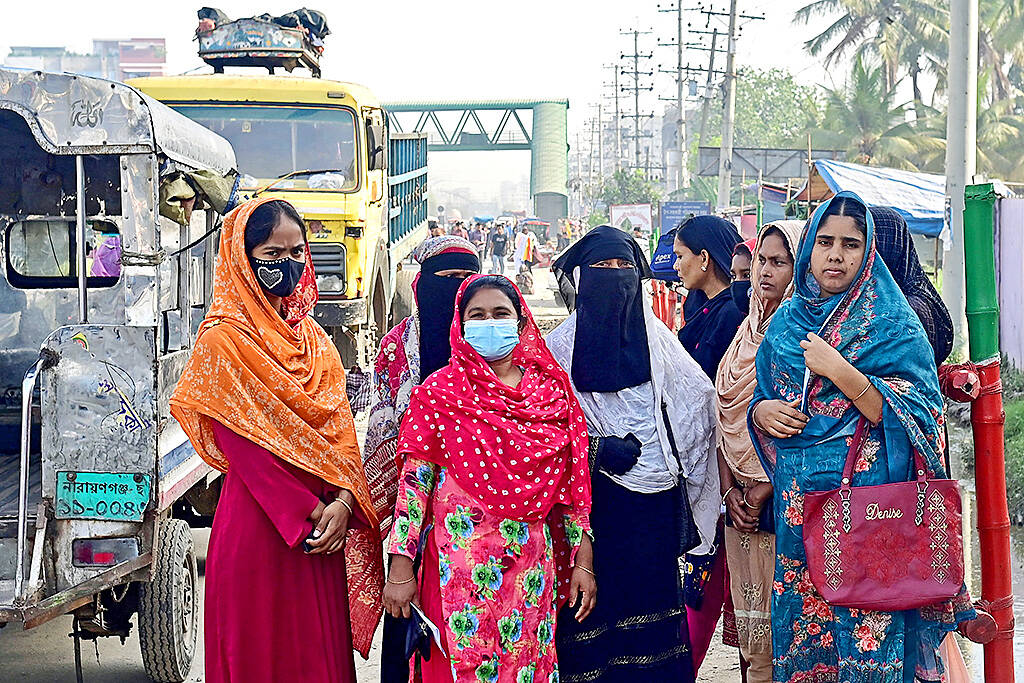The deadly consequences of fast fashion were spotlighted a decade ago after 1,138 people were killed when the nine-story Rana Plaza garment factory collapsed in Bangladesh.
While the tragedy piled pressure on top brands churning out ever-rising mountains of clothes to ensure better standards, abuses in the textile industry continue:
FACTORY HELLHOLES

Photo: AFP
The collapse of Rana Plaza near the capital Dhaka was the worst in a series of disasters in textile factories in Bangladesh, the world’s second-largest garment exporter after China, and other Asian countries.
A year earlier, at least 111 workers were killed in a fire at a textile factory in Dhaka that produced for US retail giant Walmart, among others, and more than 250 workers died in a blaze in a factory in the Pakistani city of Karachi that produced jeans for German discount chain KiK.
The scale of the disaster at Rana Plaza, which produced clothes for Primark and Benetton, among others, proved a turning point.

Photo: AFP
Under intense scrutiny, top brands, retailers and trade unions agreed to work together to improve safety conditions in Bangladeshi factories.
About 1,820 factories — accounting for more than 80 percent of exports — have been inspected since. Most have been declared fully or almost fully safe.
While Bangladesh has had no major textile factory disasters since 2013, such tragedies have continued to occur elsewhere.
Several people have died in fires at illegal garment factories in the Indian capital New Delhi and in Morocco, 28 people died when heavy rain flooded an illegal basement factory in the port city of Tangiers in 2021.
FORCED LABOR ALLEGATIONS
China is accused of having interned more than a million Uighurs, a Muslim minority living in the northwestern Xinjiang region, in political re-education camps and exploiting some of them for forced labor in cotton fields.
Beijing has dismissed the charges, saying it is operating vocational training centers to counter religious extremism.
Global brands including Adidas, Gap, Nike and Puma were drawn into the controversy after it emerged they were using cotton from Xinjiang, which produces a fifth of the world’s supply.
In 2021, French magistrates opened an inquiry into claims that four fashion groups, including Uniqlo and the owner of Zara, were complicit in crimes against humanity by profiting from forced labor in Xinjiang.
ROCK BOTTOM WAGES
The meager salaries of textile workers in the Indian subcontinent are often flagged, but being paid a pittance to deliver fast fashion is an issue in Europe and the US, too.
In Britain in 2020 for example, investigations by the NGO Labor Behind the Label and several media outlets found textile workers in the central English town of Leicester were sometimes earning as little as two British pounds (US$2.63) an hour.
Low wages have sparked protests around the world, notably in Asia.
After years of violent, deadly demonstrations in Cambodia, garment workers finally secured a minimum monthly wage that is higher than most other countries in the region. In 2023, it was set at US$200.
TOXIC DUMPING GROUNDS
In the era of fast fashion, the average person buys 60 percent more clothing than 15 years ago, while each item is kept for only half as long, according to the UN last year.
A throw-away culture generates growing mountains of waste, much of which ends up in mega dumps in the southern hemisphere.
“Every second, the equivalent of one garbage truck of textiles is dumped in a landfill or burned”, said the UN. The Dandora landfill in Nairobi, for example, receives 4,000 tons of rubbish per day, according to Changing Markets Foundation.
TOP POLLUTER
The textile industry is also a major polluter, causing between two and eight percent of global carbon emissions, according to the UN in 2022.
It is responsible for 25 percent of the pollution of the world’s waters and a third of microplastic discharges into the oceans — a toxic substance for fish as well as humans.

One of the biggest sore spots in Taiwan’s historical friendship with the US came in 1979 when US president Jimmy Carter broke off formal diplomatic relations with Taiwan’s Republic of China (ROC) government so that the US could establish relations with the People’s Republic of China (PRC). Taiwan’s derecognition came purely at China’s insistence, and the US took the deal. Retired American diplomat John Tkacik, who for almost decade surrounding that schism, from 1974 to 1982, worked in embassies in Taipei and Beijing and at the Taiwan Desk in Washington DC, recently argued in the Taipei Times that “President Carter’s derecognition

This year will go down in the history books. Taiwan faces enormous turmoil and uncertainty in the coming months. Which political parties are in a good position to handle big changes? All of the main parties are beset with challenges. Taking stock, this column examined the Taiwan People’s Party (TPP) (“Huang Kuo-chang’s choking the life out of the TPP,” May 28, page 12), the Democratic Progressive Party (DPP) (“Challenges amid choppy waters for the DPP,” June 14, page 12) and the Chinese Nationalist Party (KMT) (“KMT struggles to seize opportunities as ‘interesting times’ loom,” June 20, page 11). Times like these can

June 23 to June 29 After capturing the walled city of Hsinchu on June 22, 1895, the Japanese hoped to quickly push south and seize control of Taiwan’s entire west coast — but their advance was stalled for more than a month. Not only did local Hakka fighters continue to cause them headaches, resistance forces even attempted to retake the city three times. “We had planned to occupy Anping (Tainan) and Takao (Kaohsiung) as soon as possible, but ever since we took Hsinchu, nearby bandits proclaiming to be ‘righteous people’ (義民) have been destroying train tracks and electrical cables, and gathering in villages

Dr. Y. Tony Yang, Associate Dean of Health Policy and Population Science at George Washington University, argued last week in a piece for the Taipei Times about former president Ma Ying-jeou (馬英九) leading a student delegation to the People’s Republic of China (PRC) that, “The real question is not whether Ma’s visit helps or hurts Taiwan — it is why Taiwan lacks a sophisticated, multi-track approach to one of the most complex geopolitical relationships in the world” (“Ma’s Visit, DPP’s Blind Spot,” June 18, page 8). Yang contends that the Democratic Progressive Party (DPP) has a blind spot: “By treating any